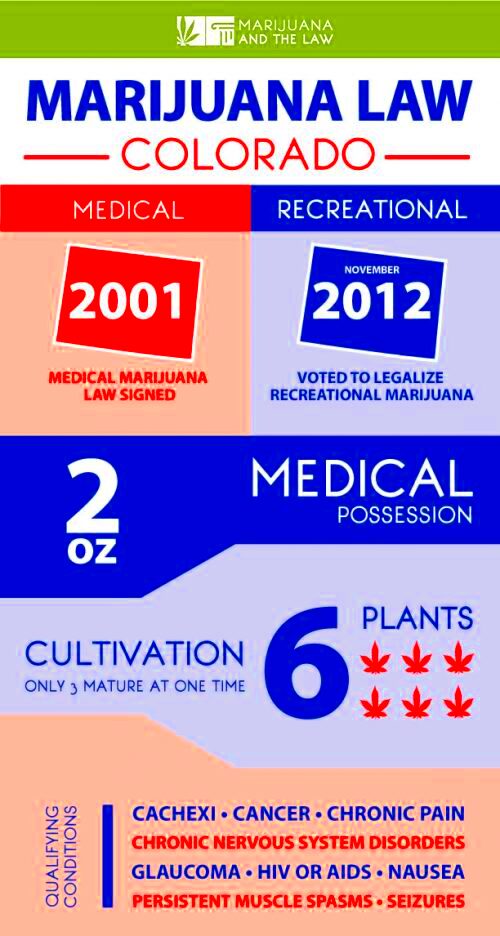Understanding Colorado Medical Marijuana Laws
For quite some time, Colorado has been a forerunner in the drive for cannabis legalization, paving the way for medical marijuana legislation. These laws were created so that patients could access legal medical marijuana for therapeutic use. It is important to note these regulations before deciding whether or not to use medical marijuana as part of your health-care regimen. The purpose of this guide is to simplify the significant components of Colorado’s medical marijuana laws by providing clear explanations about them, so you can go through the process smoothly.
Eligibility Criteria for Medical Marijuana Use

Certain eligibility standards must be met by patients who want to use marijuana for medical purposes in Colorado. Here are the essential requirements:
- Age Requirement: Patients must be at least 18 years old. Minors can qualify but need parental consent and a signed agreement from a physician.
- Qualifying Medical Conditions: Patients must have a documented medical condition that qualifies for medical marijuana. Some common conditions include:
- Chronic pain
- Severe nausea
- Seizures
- Muscle spasms
- Glaucoma
- PTSD
- Terminal illness
- Physician Recommendation: A licensed physician must recommend medical marijuana for the patient’s condition, confirming that traditional treatments have been ineffective.
Following this guideline would enable patients to begin acquiring their medical cannabis permits.
Application Process for Medical Marijuana Card

Acquiring a medical cannabis card in Colorado is an easy process but takes precision. Below is a simple guideline.
- Consult with a Qualified Physician: Start by scheduling an appointment with a licensed physician experienced in recommending medical marijuana. Ensure that your condition qualifies.
- Obtain a Written Recommendation: After your consultation, the physician will provide you with a written recommendation if they believe medical marijuana is appropriate for your condition.
- Gather Required Documents: Prepare the necessary documents, which typically include:
- A completed medical marijuana application form
- Your physician’s recommendation
- A copy of your ID or driver’s license
- Proof of residency in Colorado
- Submit Your Application: You can submit your application online or by mail to the Colorado Department of Public Health and Environment (CDPHE). Ensure all documents are accurate and complete.
- Pay the Application Fee: A fee is required, which varies based on whether you are a new applicant or renewing your card.
- Await Approval: After submission, it typically takes around 35 days to receive your card. You can check your application status online.
Upon gaining approval, it is lawful for you to buy and own medical marijuana at authorized dispensaries throughout Colorado state.
Regulations Surrounding Medical Marijuana Dispensaries
In Colorado, there are strict regulations governing medical marijuana dispensaries that are intended to ensure their safety, quality and compliance with the laws of the state. Patients as well as dispensary owners need to understand these regulations. Dispensaries are required to follow guidelines established by the CDPHE and local authorities. Here are some of the main rules:
- Licensing Requirements: Dispensaries must obtain a state license and comply with local zoning laws. This ensures that they are legally allowed to operate in their respective areas.
- Product Quality Standards: All medical marijuana products must meet specific safety and quality standards. Dispensaries are required to test their products for potency and contaminants, such as pesticides and mold.
- Labeling and Packaging: Products must be clearly labeled with information about THC content, ingredients, and dosage recommendations. Packaging should be child-proof and designed to prevent tampering.
- Age Restrictions: Only individuals with a valid medical marijuana card can purchase products from dispensaries. Staff must verify the age and eligibility of every customer.
- Inventory Tracking: Dispensaries are required to maintain detailed records of their inventory, including sales and product origins, to ensure compliance with state regulations.
The regulations are meant to provide a safe atmosphere for patients. At the same time, they also ensure that dispensaries operate smoothly and responsibly.
Possession Limits and Restrictions for Patients
The moment that you have a medical marijuana card, it is essential for you as a patient in Colorado to know the possession limits and restrictions that are applicable to you. Here are the important things that you should be informed of:
- Possession Limits: Registered patients can possess up to:
- Two ounces of medical marijuana flower
- Up to 800 milligrams of concentrated marijuana products
- Up to 40 marijuana plants (if grown at home, limits apply based on how many patients reside at the address)
- Consumption Restrictions: Medical marijuana can only be consumed in private residences. Public consumption is prohibited, and violations can lead to fines or legal issues.
- Transporting Medical Marijuana: When transporting marijuana, it should be stored in a closed container and kept out of reach while driving. It’s also illegal to transport marijuana across state lines.
- Reciprocity Rules: Colorado recognizes medical marijuana cards from other states, but patients must adhere to Colorado’s possession limits while in the state.
Getting this, helps you to abide by the law and also take advantage of marijuana for medical purposes in a responsible manner.
Legal Protections for Medical Marijuana Users
In order to stop patients from being judged or prosecuted because of their consumption of medicinal cannabis, Colorado has implemented legal measures to protect medical marijuana users. The rights that these individuals possess include:
- Employment Protections: Colorado law prohibits employers from discriminating against employees based solely on their medical marijuana use. However, employers can still enforce drug-free workplace policies and terminate employees who violate them.
- Housing Protections: Tenants with a medical marijuana card cannot be denied housing solely based on their status as medical marijuana users. However, landlords can prohibit marijuana use in their properties.
- Parental Rights: Medical marijuana use does not automatically affect parental rights in custody cases. Courts will consider various factors, but being a medical marijuana patient alone is not grounds for losing custody.
- Protection from Arrest: Registered patients are protected from arrest for possession and use of medical marijuana within the limits established by state law.
- Access to Care: Medical marijuana patients have the right to discuss their treatment options with healthcare providers and receive appropriate medical care without discrimination.
By providing legal safeguards, patients can receive treatment without worry of being punished and, consequently, enjoy the advantages of medical marijuana safely.
Challenges and Considerations for Medical Marijuana Patients
There are numerous benefits as far as laws guiding medicinal marijuana use in Colorado are concerned but patients encounter different challenges. Understanding these will aid you in wandering through medical marijuana more effectively. Some of the challenges include:
- Access to Care: Not all healthcare providers are comfortable discussing or recommending medical marijuana. Patients may need to find a doctor experienced in this area, which can be a hurdle.
- Cost of Treatment: Medical marijuana can be expensive, especially for patients who require it regularly. Insurance typically does not cover the costs, which can strain finances.
- Quality and Consistency: With various dispensaries offering different strains and products, ensuring consistency in quality can be a challenge. Patients should research dispensaries and their product testing standards.
- Legal Gray Areas: Despite state legalization, medical marijuana remains illegal at the federal level. This creates confusion, especially regarding travel, banking, and legal rights.
- Public Perception: Although attitudes are changing, stigma around medical marijuana use can affect personal relationships and social interactions.
So that patients can invest conscious, informed pickings as well as search for backing they require without much difficulty in maintaining healthy health.
Frequently Asked Questions about Colorado Medical Marijuana Laws
Patients often inquire about the laws surrounding medical marijuana in Colorado. Hence, these are a few typical inquiries that may help clarify usual worries:
- What conditions qualify for medical marijuana? Common qualifying conditions include chronic pain, PTSD, seizures, and terminal illnesses. A full list can be found on the CDPHE website.
- Can I grow my own marijuana? Yes, registered patients can grow their own marijuana, but they must adhere to local laws regarding the number of plants and secure their grow area.
- How long is my medical marijuana card valid? Your card is typically valid for one year, after which you must renew it by going through the application process again.
- What if I lose my medical marijuana card? If you lose your card, you can request a replacement from the CDPHE. It’s important to keep a copy of your physician’s recommendation as well.
- Can I use medical marijuana while driving? It is illegal to drive under the influence of marijuana. Patients should be cautious and know the law regarding impairment.
The aim of these FAQs, is to boost patient’s self-assurance and edification on their rights and obligations with respect to the medical marijuana laws in Colorado.
Conclusion on Understanding Colorado Medical Marijuana Laws
Hence, it is imperative for patients who want to find relief using cannabis to know about Colorado’s medical marijuana laws. The government has provided a thorough legal structure that helps patients and guarantees security and adherence. Being knowledgeable enables patients to choose the right way from filling in the applications up to the norms guiding dispensaries.
Despite some hurdles such as availability of healthcare services or how the public sees them, clients should be able to take control through knowledge and enlightenment. It is very important to keep updated about the legislation and rules if you have never used marijuana for medicinal purposes before or if you rely on it quite often.
This allows patients to concentrate on the most important things, namely their health and wellbeing. The responsible use of medical marijuana is still being set up by Colorado for those who really need it.
